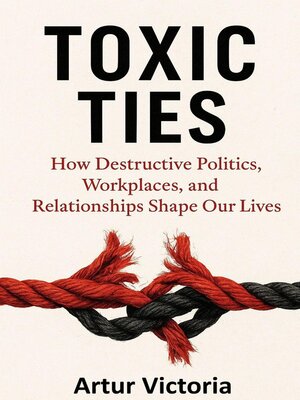Toxic Ties--How Destructive Politics, Workplaces and Relationships Shape Our Lives
ebook ∣ Education, #7 · Education
By Artur Victoria

Sign up to save your library
With an OverDrive account, you can save your favorite libraries for at-a-glance information about availability. Find out more about OverDrive accounts.
Find this title in Libby, the library reading app by OverDrive.



Search for a digital library with this title
Title found at these libraries:
| Library Name | Distance |
|---|---|
| Loading... |
The word has become cultural shorthand — toxic politics, toxic workplaces, toxic friendships, toxic social media — but the widespread use of the term is more than just a linguistic fad. It signals a collective recognition that something is deeply wrong with the relationships that shape both our private lives and our public systems.
At first glance, these forms of toxicity may seem unrelated. An intimidating boss seems a far cry from a corrupt prime minister. A manipulative friend has little to do with an authoritarian regime. A violent partner seems to have nothing in common with an online disinformation campaign. But beneath the surface, these destructive dynamics are not at all separate.
This book argues that toxicity is best understood as a systemic condition, not as a collection of isolated incidents. Like poison spreading through water, toxic dynamics seep into the ecosystems they inhabit. A work culture based on fear and favouritism is not confined to the office; it spreads to homes, families, and communities. Corruption in politics erodes public trust and normalises dishonesty, which then seeps into business practices, educational environments, and even personal interactions.
In this sense, toxic ties are interconnected threads of the same web. They connect the personal to the political, the intimate to the institutional. When we zoom out, patterns emerge:
Abuse of power, whether at home or in parliament, thrives on secrecy and silence.
Manipulation, whether by a controlling partner or a state propaganda machine, relies on distorting reality until people lose confidence in their own judgement.
Favouritism, whether in the workplace or in government contracts, undermines justice and divides communities.
The repetition of these patterns across different domains shows us that toxicity is not random. It is structured. It is learned, transmitted and reinforced until it seems normal — until people begin to confuse abuse with leadership, intimidation with discipline, and control with love.







